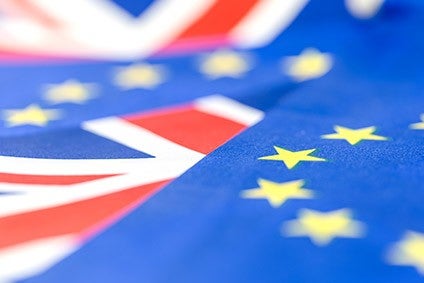
The UK government’s worst-case assumptions for a no-deal departure from the European Union include the fear that the supply of certain types of fresh food will decrease which could lead to rising prices and panic buying.
Its Operation Yellowhammer document, prepared on 2 August but released yesterday (11 September), forms the basis of no-deal planning based on a 31 October Brexit deadline. The assumptions had previously been extensively ‘leaked’ in an article in The Sunday Times newspaper but have not been confirmed by the UK government until now.

Discover B2B Marketing That Performs
Combine business intelligence and editorial excellence to reach engaged professionals across 36 leading media platforms.
The stark assumptions talk about possible public disorder and severe disruption to cross-channel routes, affecting the supply of medicines and certain types of fresh foods.
The five-page document – which the government was legally enforced to publish – said lorries could have to wait up to two and a half days to cross the English Channel because of “significant queues” in Kent [the English county abutting the English Channel from where many exports to France depart].
But it is the food-supply issue which will create many of the headlines.
“Certain types of fresh food supply will decrease,” it said. “Critical dependencies for the food-supply chain (such as key input ingredients, chemicals and packaging) may be in shorter supply.”

US Tariffs are shifting - will you react or anticipate?
Don’t let policy changes catch you off guard. Stay proactive with real-time data and expert analysis.
By GlobalDataIt added: “These two factors will not cause an overall shortage of food in the UK but will reduce availability and choice of products and will increase price.”
It points out that the UK growing season will have come to an end and the agri-food supply chain will be under increased pressure at this time of year due to preparations for Christmas, which is the busiest time of year for food retailers.
“There is a risk that panic buying will cause or exacerbate food-supply disruption,” it said.
The document said the flow of traffic across the English channel could be reduced by as much as 60% on the first day after a no-deal Brexit and that the worst disruption could last for up to three months.
And it said that business readiness for a no-deal – especially among small- and medium-sized businesses – will remain at a low level, “compounded by seasonal effects impacting on factors such as warehouse availability”.
Michael Gove, the government minister in charge of no-deal planning, said that assumptions contained in the document were currently being reviewed.
“It describes what could occur in a reasonable worst-case scenario, thus providing a deliberately stretching context for government planning to ensure that we are prepared for exit,” he said.
But Ian Wright, CEO of UK industry body the Food and Drink Federation, tweeted: “It is as the Food and Drink Federation have been saying for the best part of two years now – it lays bare the grisly crisis facing the UK’s food and drink supply chain in a no-deal-Brexit scenario.”
He added: “And shoppers have rightly come to expect a wide range of products on supermarket shelves. In a no-deal Brexit scenario there would be significant and adverse changes to product availability, and random shortages.
“[The] government must be upfront about the chaos a no-deal Brexit would bring.”
Since the Yellowhammer document was drawn up, Prime Minister Boris Johnson’s plan to leave the European Union on 31 October, whether there is a deal in place or not, has been voted down by the UK’s Parliament.



